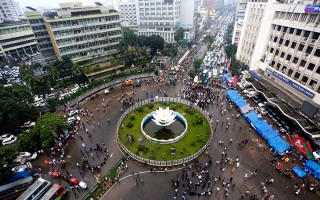Banking sector under severe stress
The banking sector performance has come under severs stress over the five years since 2015–16 because of the rising non-performing loan and a slowdown in the private-sector credit growth.
The NPL has doubled to 12 per cent in 2018–19 from 6 per cent in 2010–11, according to the proposed eighth five-year plan of the ministry of planning.
The NPL ratio in the state-owned banks has accelerated to 32 per cent from 11 per cent in the same period, mentioned the plan expected to be approved soon.
General Economics Division member Dr Shamsul Alam on Thursday told New Age that they tried to present the picture prevailing in the banking sector.
Recommendations have also been suggested in the paper for the much-needed improvement in the sector in the next five years, he said.
The GED under the ministry of planning in the draft said that the private-sector bank credit growth as percentage of the gross domestic product came down to 47 per cent in 2018-19 from 49 per cent in 2015-16.
This decline is particularly worrisome because the county is still behind most regional competitors except Pakistan in terms of the indicator, said the draft.
Bangladesh with 46.8 per cent private-sector credit growth lags behind India (50 per cent) in terms of financial deepening in 2018–19, and is well behind China (161.1 per cent) and Vietnam (133.1 per cent).
Among the suggestions for bringing about improvement in the banking sector, the draft plan sought greater autonomy for the central bank and stressed recovering loan from wilful defaulters.
Former Bangladesh Bank governor Salehuddin Ahmed on Saturday said that the government eventually recognised the problems in the banking sector.
But, he noted, the draft should make suggestions for addressing the problems of good governance and political influence that caused a series of scams.
The Hallmark scam in Sonali Bank and the extension of shady loans from BASIC Bank, led by its former chairman Sheikh Abdul Hye Bacchu, remain unaddressed.
The government provided Tk 14,655 crore to bail out state-owned banks, including the BASIC and Sonali banks, in eight years until 2017.
A total of Tk 11,487 crore or 78 per cent of the subsidy, which the government calls recapitalisation fund, was given between 2013–14 and 2016–17 mainly to Sonali Bank and BASIC Bank.
Centre for Policy Dialogue, a local think-tank, has been demanding appointment of a commission on the banking sector as part of starting the much-needed reform in the sector.
But the demand remains ignored by the government.
Last month, Transparency International Bangladesh presented a paper titled Banking Sector Supervision and Regulating Defaulted Loan: Governance Challenges of Bangladesh Bank and Way Forward.
TIB in the paper said that the sector was on the brink of collapse due to massive irregularities and deterioration of the central bank’s control over the banking system.
According to the draft eight five-year plan, the banking sector reforms started in the early 1980s and gathered momentum in the 1990s and 2000s.
Many of the serious reforms that impacted on the quality and health of the banking sector happened after 1999, said the draft.
News Courtesy:
www.newagebd.net











